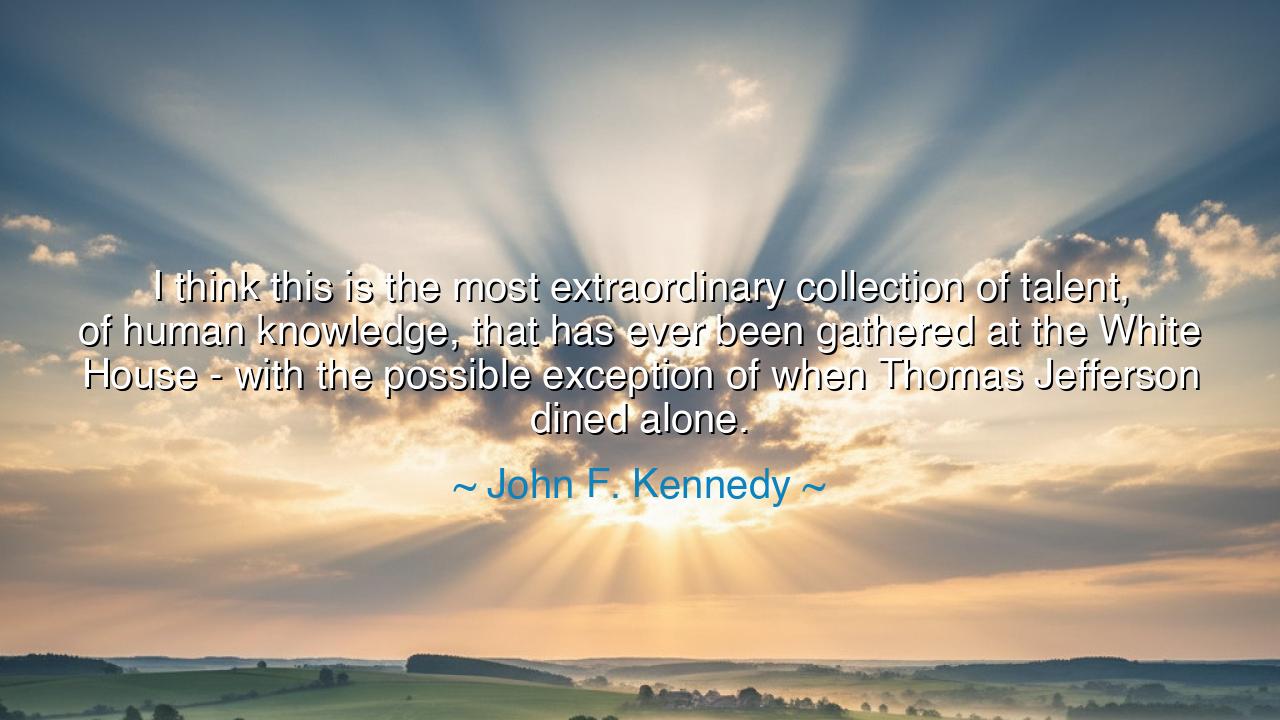
I think this is the most extraordinary collection of talent, of
I think this is the most extraordinary collection of talent, of human knowledge, that has ever been gathered at the White House - with the possible exception of when Thomas Jefferson dined alone.






"I think this is the most extraordinary collection of talent, of human knowledge, that has ever been gathered at the White House - with the possible exception of when Thomas Jefferson dined alone." These words, spoken by John F. Kennedy, hold within them both a tribute to the remarkable minds that have shaped the course of American history and a humble acknowledgment of the vast wisdom of one of America’s most enlightened presidents—Thomas Jefferson. In this seemingly playful remark, Kennedy emphasizes the rarefied air of intellect that he himself was privileged to witness during his presidency, while simultaneously elevating Jefferson’s singular genius. The comparison suggests that, though the White House may host the most brilliant minds in history, there is something uniquely extraordinary about the depth of knowledge and insight that Jefferson possessed, a mind so profound that it could rival, and even surpass, the collective wisdom of the greatest leaders and thinkers assembled in one room.
What Kennedy highlights is the significance of individual brilliance and the often overlooked power of solitude. Jefferson, despite being surrounded by powerful political figures and intellectuals throughout his life, found solace in his own thoughts, in the stillness of his personal reflection. The quote touches upon the ancient wisdom that solitude often nurtures the greatest minds. It is in solitude, far from the distractions of the crowd, that visionary thinking can emerge. Jefferson’s solitary moments of reflection, when he dined alone, are symbolic of the time he spent in quiet contemplation, giving birth to ideas that would help shape the American Republic and revolutionize the world’s understanding of democracy and liberty.
The ancients, too, revered the power of solitude. Socrates, the great philosopher, often sought seclusion to reflect and debate within himself, believing that the most profound truths arose from one’s inner dialogue. His teachings about the necessity of self-examination have endured through the centuries, reminding us that true wisdom is often birthed in quiet, individual thought, far removed from the noise of society. It is in these moments of introspection that the greatest discoveries about human existence, morality, and society are made. This, too, was the environment in which Jefferson thrived—a mind at peace with itself and deeply connected to the profound truths of nature and governance.
Moreover, Kennedy’s words evoke the rich history of the American founding fathers, a collection of minds who, much like Jefferson, stood apart from the crowds, not because they shunned the public, but because they were able to think clearly and deeply about the world and its possibilities. Benjamin Franklin, for example, spent long hours in solitary study and experimentation, even while playing a central role in the politics of the American Revolution. Franklin’s inventions and ideas—ranging from the Franklin stove to the kite experiment—were the fruits of his long hours of quiet reflection and solitary pursuit of knowledge. These men, much like Jefferson, demonstrated that in the stillness of solitude resides the potential for great progress, and it is through this isolation that they were able to contribute to a new world vision.
Kennedy’s remark, however, also underscores the immense value of collaboration and collective intelligence. While Jefferson’s mind was brilliant in its own right, Kennedy understood that the true power of leadership lies in the ability to gather diverse wisdom and talent. The White House, in Kennedy’s time, was a space where ideas were debated, and visions for the future of the nation were shaped by the brilliant minds around him. The Camelot era, as it came to be known, was marked by the confluence of intellect—a gathering of individuals from different walks of life, each contributing to the common goal of building a stronger, more just society. Yet, Kennedy’s humor and self-awareness reveal that, despite the brilliance of those assembled, there was something distinctly unique about Jefferson’s intellectual legacy—the solitary depth of his understanding, formed in private, which could stand alone in greatness.
From this, the lesson is clear: solitude is not to be feared, but embraced. There is a profound strength in solitude, and through it, creativity and wisdom can flourish. Yet, while individual brilliance is essential, so too is the recognition of the importance of collaboration—the blending of different minds, experiences, and perspectives that create something greater than the sum of its parts. We must learn to strike a balance between the reflection found in solitude and the interaction found in community, knowing when to step back into the world and when to retreat into silence. This duality—the solitary pursuit of knowledge and the collective sharing of ideas—is the path to both personal greatness and societal progress.
In practical terms, this means that we should take time to cultivate our own moments of solitude, to listen to our inner thoughts and engage in self-reflection. At the same time, we must not shy away from the brilliance of others, but seek to learn from the minds that have shaped the world. Greatness is not found solely in isolation, nor solely in collaboration, but in the harmonious interplay of both. To achieve anything truly remarkable in life, we must find solace in our own thoughts while also surrounding ourselves with those whose wisdom and perspective challenge us to grow and evolve. Just as Jefferson dined alone to contemplate the future, so too must we create moments of peaceful introspection, even as we reach out to the world for guidance, partnership, and strength.






AAdministratorAdministrator
Welcome, honored guests. Please leave a comment, we will respond soon